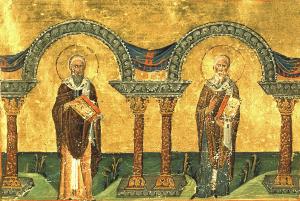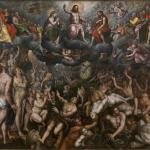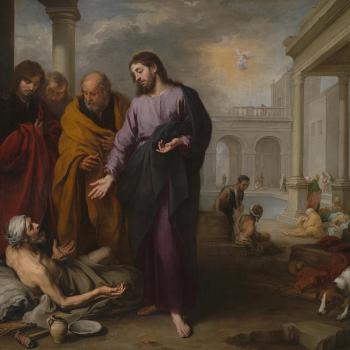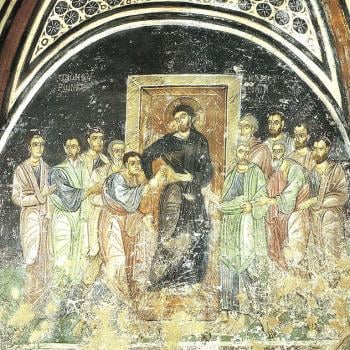
While “Jesus Christ is the same yesterday and today and for ever” (Heb. 13:8 RSV), our understanding and relationship with Jesus is in constant flux. That is because we are temporal beings who are constantly changing, and as we change, we will find our ways of engaging Jesus, and what we learn from that engagement, changes. Hopefully, we will find ourselves attaining greater and greater insight into who he is. This often means we will have to take what we have previously learned and understood, and analyze it in light of our new insight, leading to even further insight into who he is, even as we will learn even more how all that new insight not only answers questions we have had, but how it also applies to our daily lives. This is an important aspect of our walk with Christ. We must not let our faith stagnate, but we also must be careful, and not confuse personal biases and ideologies with the insights which we have gained, because, when we do that, we will impose erroneous concepts upon our reflections, leading us to wrong conclusions. This is why we have been warned, “Do not be led away by diverse and strange teachings; for it is well that the heart be strengthened by grace, not by foods, which have not benefited their adherents” (Heb. 13:9 RSV).
We must always be willing to grow in our faith, and in doing so, to learn new things, but we must make sure we do so by integrating the elements of the truth which we have already learned to our reflections, for this will help make sure we do not be led to follow “strange teachings.” This is true, not only for our personal spiritual development, but for the institutional church as a whole, and the church, knowing this, can be shown to be doing what it can to come to terms with what it has leaned about Christ, developing not only its understanding, but the way it can explain that understanding to others, with ecumenical councils being among the most authoritative way the institutional church does this.
The history of the first six ecumenical councils, the councils which are remembered in the Byzantine tradition on this Sunday, shows us the way the institutional church came to find out the best way to explain the revelation handed to it by Christ, revelation which included what it knew about who Christ is and what Christ’s identity means for us and our own spiritual (and temporal) development. Sadly, in and through that examination, there was a great deal of internal strife, strife which showed Christians lost the way of love as they fought each other, vying for power and authority in the church. Even those who were theologically right were not always right in how they treated each other. And, when charity was lost, Christians could and would not properly listen to each other, leading to all kinds of miscommunication going on, where Christians, using different conventions, were trying to say the same thing without always realizing this. There were those, of course, who ended up with a wrong understanding of Christ, some who produced dangerous teachings which had to be, and were, repudiated by the institutional church (while the way many did this lacked charity, so that those they could have and should have helped see where they went wrong, were unwilling to listen and became stuck in their errors).
At its ecumenical councils, the institutional church slowly developed conventions which it would use to help answer the questions it was given, and through those answers, it would provide subsequent generations a foundation which they can use to come to know the truth revealed by Christ for themselves. While some confuse the conventions for the answers being given by the church, this was not the case; the conventions were always understood as human constructs which served as pointers to the transcendent truth of Christ. While many, like St. Hilary of Poitier, would remind their audience of this fact, many others ignored it and got so caught up on the conventions, they lost sight of the greater truth and the fact that others could say the same thing with different conventions. In the present age, theologians have come to see how such miscommunications caused schisms in the church, that those involved in such schisms were often trying to point to the same truth, but in different fashions, which is why they are able to dialogue with each other and come to agreement with each other, even if they still use different conventions.
What the institutional church knows is that we should all recognize Jesus is God the Word, the Logos, who assumed human nature so that he is both God and human without any corruption or mixing of the two natures. Traditionally, through its ecumenical councils, the institutional church has established a general formula, one which says Jesus is one person who possesses and acts with two natures, divine and human. Not everyone understands the concepts of person or nature the same, which is why so many debates can be had by those who mean the same thing with different words. This is something, thankfully, was understood early in Christian history, and once it was recognized, agreements can and were made by those who used the terms differently, with a declaration made by John of Antioch and St. Cyril of Alexandria perhaps being the most important example of this. Still, like Vladimir Solovyov, we can understand there will be disagreements between Christians, but those disagreements will not be on the dogmatic level, but in regards theological speculations; Christians can have a variety of opinions which differ with each other, so long as they agree on fundamentals, a point Solovyov made when he wanted to promote unity between Catholics and the Orthodox:
It is now clear that this necessary distinction between the doctrine of the Church, as such, and the doctrine of a school or of theologians is very beneficial for the cause of the Reunion of the Churches. In effect the dogmas of our Church, reduced to the decision of ecumenical councils, are consequently altogether orthodox and catholic and the doctrines of theologians in contradiction to Catholicism are not dogmas of faith determined by the Church. So we are united with Catholicism because we ourselves recognize absolute and immutable truth, while the errors that separate us from catholic unity are only opinions having no higher authority than in the eyes of the authors and abettors of these opinions. [1]
In one of the most theologically dense passages of Scriptures, one important for Christological and Trinitarian discussions, we find Jesus giving us all kinds of insights about himself and his relationship with God the Father. However, what is important for us here is that we find he does this while telling us that the unity found in the Trinity is what he wants for Christians:
Sanctify them in the truth; thy word is truth. As thou didst send me into the world, so I have sent them into the world. And for their sake I consecrate myself, that they also may be consecrated in truth. “I do not pray for these only, but also for those who believe in me through their word, 1 that they may all be one; even as thou, Father, art in me, and I in thee, that they also may be in us, so that the world may believe that thou hast sent me (Jn. 17:-21 RSV).
We are called to glorify God in our knowledge and Jesus and who he is. “And this is eternal life, that they know thee the only true God, and Jesus Christ whom thou hast sent” (Jn. 17:3 RSV). We are to know God, but to truly know God, we must know God in and through love, for then, we will find ourselves united with God in and with that love. The more we love God, the more we love Jesus, the more we will want to know and understand our beloved, but the more we do that, the more we will realize our beloved wants us to do this without neglecting our neighbor. That is, while seeking the truth, we must do so in the correct fashion, working to remain united with our fellow Christian, and finding a way to bring others to share in that unity of love, so that together, and not apart, we come to know God and experience the glory of the divine life. This is why, when we pursue knowledge and understanding, we do not do so in an individualistic fashion, seeking our own personal glory, for in doing so, we will find ourselves cut off from the greater glory God wants for us, the glory which is found in love, a love which not only will unite us with God, but with the rest of creation.
[1] Vladimir Soloviev, The Karamazov Correspondence. Letters of Vladimir S. Soloviev. Trans. and ed. Vladimir Wozniuk (Boston: Academic Studies Press, 2019), 105 [Letter to Bishop Josip Strossmayer, Sept 21, 1886].
Stay in touch! Like A Little Bit of Nothing on Facebook.
If you liked what you read, please consider sharing it with your friends and family!
N.B.: While I read comments to moderate them, I rarely respond to them. If I don’t respond to your comment directly, don’t assume I am unthankful for it. I appreciate it. But I want readers to feel free to ask questions, and hopefully, dialogue with each other. I have shared what I wanted to say, though some responses will get a brief reply by me, or, if I find it interesting and something I can engage fully, as the foundation for another post. I have had many posts inspired or improved upon thanks to my readers.













